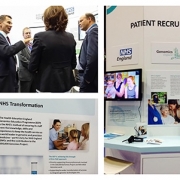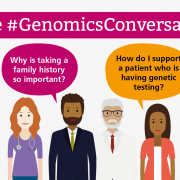GEP welcomes release of Topol Review
HEE’s newly published report outlines key recommendations for the NHS’s digital future and has genomics as a key focus
Yesterday saw the launch of the Topol Review, an independent report led by Dr Eric Topol into how best to prepare the healthcare workforce to deliver the ‘digital future’. Commissioned in 2018 by the Secretary of State for Health and Social Care, the report sets out key recommendations to support the deployment of digital healthcare technologies throughout the NHS, both now and in the future.
A spotlight on genomics and education
There are eight recommendations for genomics specifically, with a heavy emphasis on workforce development and planning. In addition, the report makes specific recommendations for education across all areas of digital technology, focusing on:
- the culture of learning;
- supporting the educators;
- education and development of the whole workforce;
- specialist workforce and specialist teams; and
- educating the future workforce.
In his address, Secretary of State for Health Matt Hancock said: “All healthcare professionals should receive education in genomics as part of core training and ongoing development.”
The programme’s contribution
Over the last five years, the Genomics Education Programme (GEP) has been laying the foundations for increased knowledge and awareness of genomics amongst all healthcare staff. This is especially important as the NHS prepares for the new NHS Genomic Medicine Service, where genomic testing will be offered by an increasing number of healthcare professionals.
The programme’s Scientific Director, Dr Anneke Seller, was a key contributor to the Topol Review, alongside other members of the programme team. In response to the publication of the review, she said: “I am pleased to see the underlying principles of the Genomics Education Programme reflected in this new report, with many of our core activities recognised as invaluable methods for upskilling the NHS workforce at pace and scale.
“The rapid development of digital technologies requires a dynamic approach to education within the NHS, and our programme is committed to contributing to conversations around educational strategy as well as continuing our core work of preparing the NHS workforce for the integration of genomic medicine.”
A sustainable future
The review’s broader recommendations aim to enable NHS staff to make the most of game-changing technologies in addition to genomics, including digital medicine, artificial intelligence and robotics.
These recommendations support the aims of the NHS Long Term Plan, and the workforce implementation plan, with the goal of ensuring a sustainable NHS offering the best quality care for all. The full report can be read on the HEE website.









